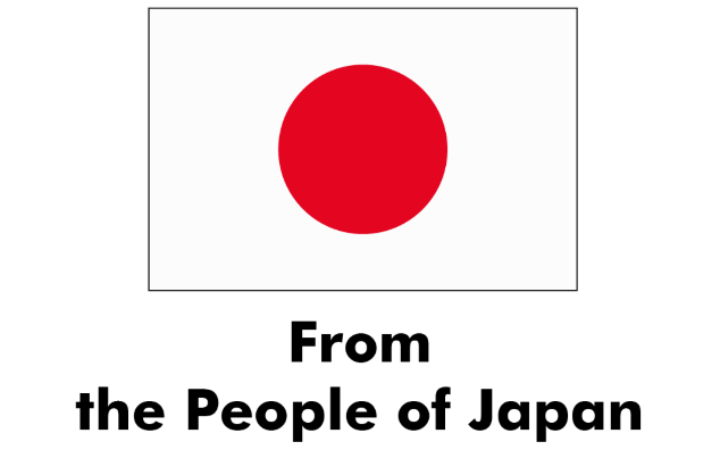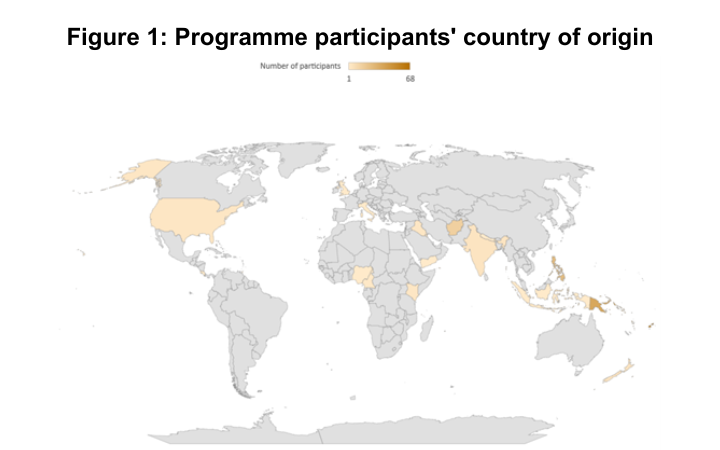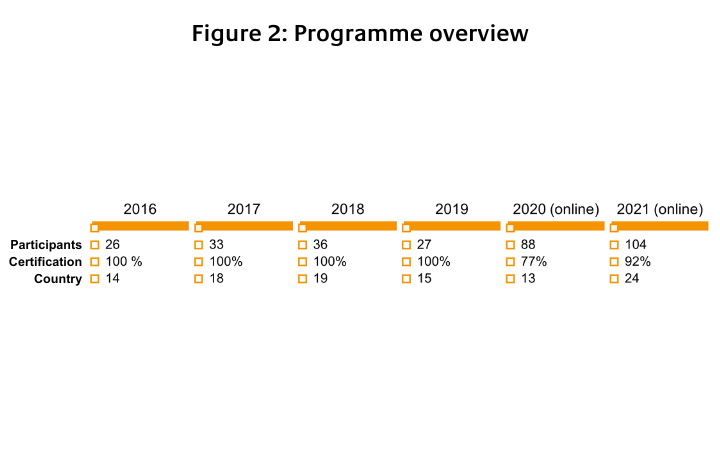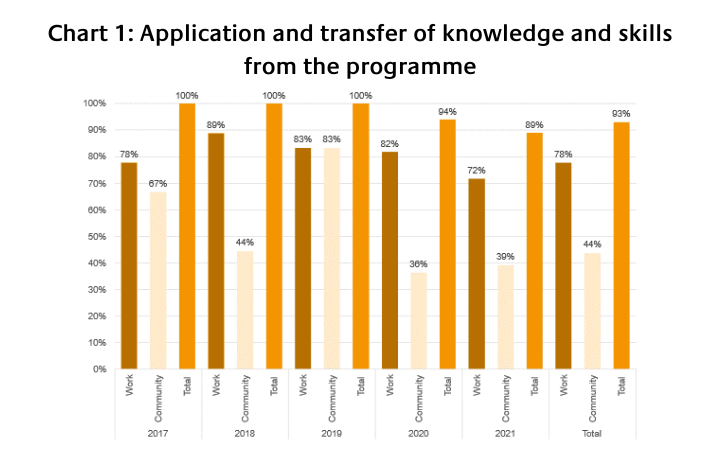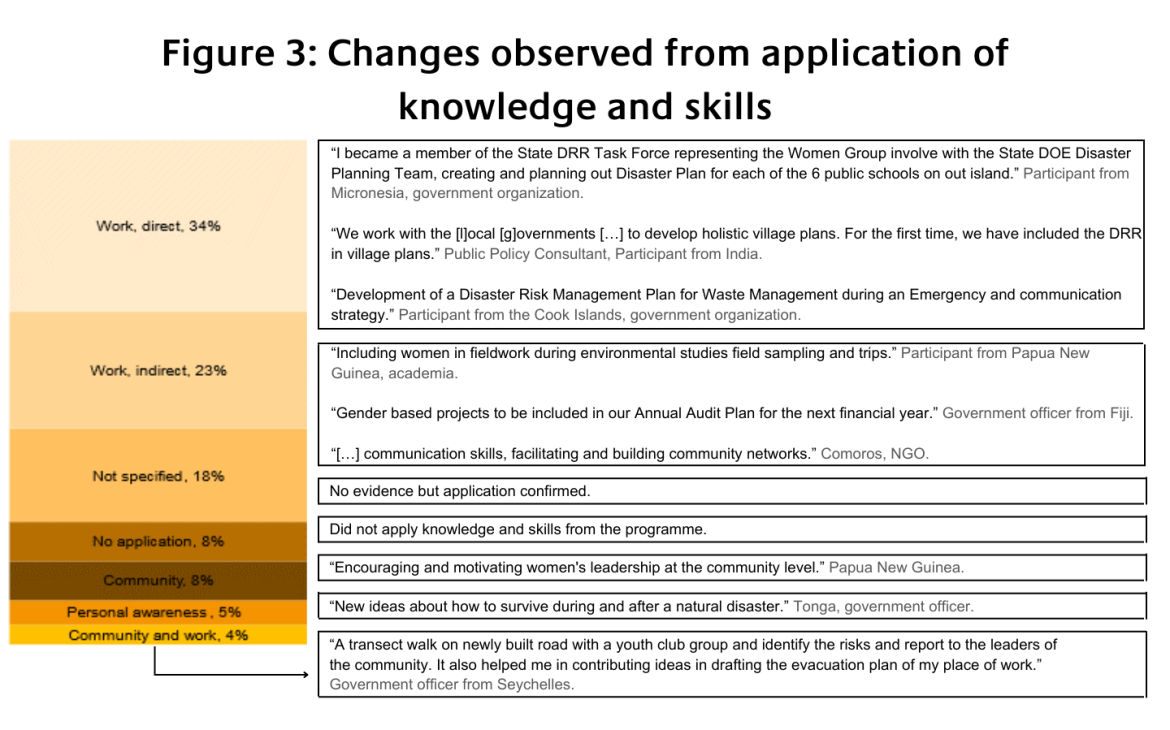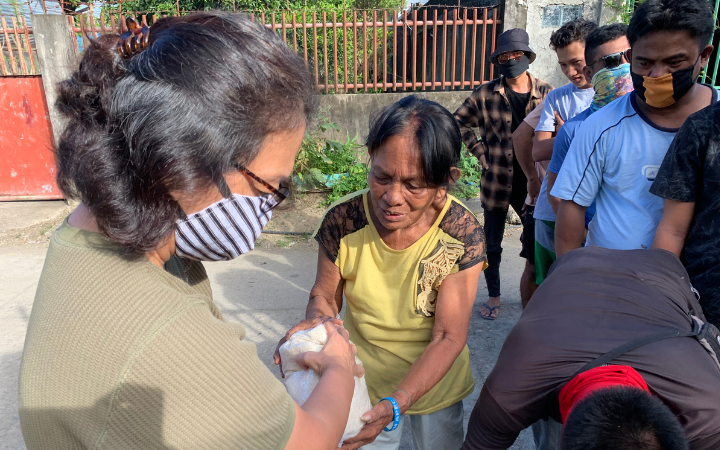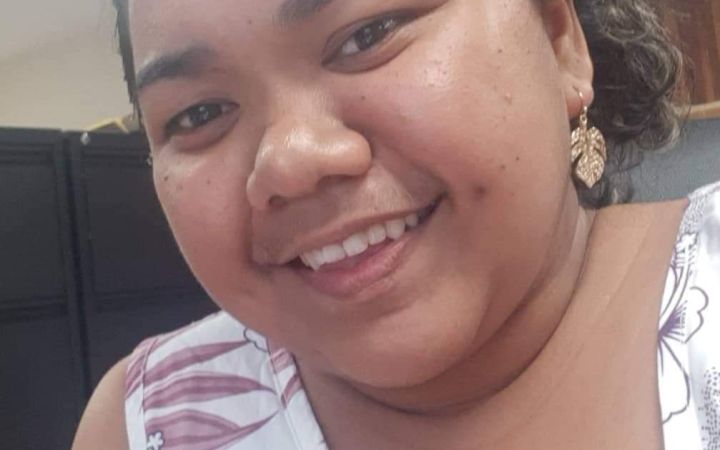Background
Since 2016, the UNITAR Hiroshima Office, in collaboration with the Government of Japan, has organized the “UNITAR Hiroshima Women’s Leadership in Tsunami-based Disaster Risk Reduction Training Programme for World Tsunami Awareness Day”. The programme's objective is to strengthen women professionals’ knowledge of tsunami-based disaster risk reduction (DRR) to better prevent, prepare, confront, and recover from tsunami-related disasters. It also develops skills in women’s leadership, inclusive approach to DRR, effective communication, and development of multi-stakeholder coalitions. The programme aims to contribute to SDGs 4 “Quality Education”, 5 “Gender Equality”, 10 “Reduced Inequalities”, 11 “Sustainable Cities and Communities”, and 16 “Peace, Justice and Strong Institutions”.
The programme contents are based on an initial learning needs assessment carried out with participants and incorporate best practices and recommendations from self-evaluations of previous programme cycles. The learning methodologies range from expert lectures and practical exercises to study tours to help participants contextualise their learnings. Also, programme participants develop an action plan based on the learnings and experiences from the workshops, which are presented at the end of the programme.
Except for the 2020 and 2021 cycles, the programme had been delivered annually in a face-to-face format in Japan for approximately one week (around Tsunami Awareness Day). For the last two cycles, the programme used a combination of on-demand e-learning courses through the EdApp platform and live webinars. The study tours were substituted by visits using virtual reality. The online modality also allowed programme alumni to join as coaches.
The programme targets women from Pacific Small Islands Developing States (SIDS) working in DRR-related fields. Since it was launched, 317 women professionals from 36 countries had registered for the programme. Figure 1 shows participants’ country of origin, with most participants coming from Fiji, Papua New Guinea, Samoa, Tonga and the Philippines.(1) A large part of the participants (67 per cent) came from government organizations, NGOs and CSOs. Between 2016 and 2021, the programme has issued 72 certificates of participation and 217 certificates of completion (84 per cent certification rate). A complete summary of the programme is provided in Figure 2.
This Impact Story collects evidence of participants’ application and transfer of knowledge and changed behaviour after completing the training programme. It builds on an online participants survey (106 responses, 36 per cent response rate) from the 2017-2021 cycle (contacts for the 2016 programme cycle were not available), 2 semi structured interviews with programme alumni, and a previous follow-up conducted by the Hiroshima Office.(2)
(1) Participants from the Philippines enrolled in the 2020 and 2021 cycles.
(2) Retrieved from UNITAR news from experiences of the 2019 cycle, 2017 cycle (I, II, III).
Application and transfer of knowledge, skills, and attitudes and observed changes
Most survey respondents were professionals working in government (44 per cent), international organizations (15 per cent), or NGOs (19 per cent). While not all respondents were directly working in DRR-related areas (e.g., disaster management, risk reduction), the programme content was still relevant to their work functions (e.g., school principal, community trainer, women’s organization representatives). Then, knowledge and skills from the programme have been used in their professional life (work settings) and their personal or collective life (in their communities, voluntary work). Overall, 93 per cent of respondents indicated having applied or transferred knowledge and skills from the programme, mostly in their professional life (78 per cent). Chart 1 shows the application rate by programme cycle. Communication skills, women’s leadership in DRR, and gender and inclusivity in DRR-related skills were the three areas from the programme that participants have used or applied more (95, 90, and 90 per cent, respectively). It is worth mentioning that all respondents from the 2017-2019 cycles reported application of competencies from the programme.
Application of knowledge from the programme has created further changes in participant’s organisations and settings, either directly, i.e., tackling inclusiveness in tsunami-based DRR, or indirectly, i.e., by incorporating some elements from the programme in their work but not necessarily linked to DRR, e.g., gender perspectives or disability-inclusiveness in other fields. Moreover, some participants have generated changes in their communities (e.g., through voluntary work) or both (community and work). A few respondents have not had the opportunity to fully apply knowledge and skills from the programme but have demonstrated increased awareness and changed attitudes towards the topics of the training. Figure 3 maps the different forms in which participants have generated changes after taking the training.
Furthermore, 65 per cent of those confirming application have done it frequently (65 per cent on many occasions or often). There is also a high attribution of the changes to the UNITAR training (70 per cent on average).(1) Respondents from the cycles 2019 and 2021 attributed the highest rates of changed behaviour to the programme (78 and 75 per cent, respectively). Applying the knowledge from the programme was important for participants’ job performance which could also be related to the high application rate (confirmed by 92 per cent of respondents). Evaluation data collected by project management also reflects the relevance of the training to participants' jobs (94 per cent on average).(2)
Having previous knowledge or practical experience with the programme contents, the training design and methodologies, and having sufficient knowledge to be applied were the factors that enabled most the application of knowledge and skills, as indicated by survey respondents. It is possible that other factors might have affected application of knowledge, however, these were not identified in this Impact Story.
More specifically, regarding the training design and methodologies, respondents pointed out the importance of DRR plans, study tours, and exchanges with the programme alumni to their understanding of the topics and application of knowledge. Nevertheless, and as expected, while all respondents from the 2017-2019 cycle considered study tours significant, this only holds for 69 per cent of respondents from the 2020 and 2021 cycles, which were delivered online. While the study tours were adapted as virtual tours, some participants from these cohorts faced some challenges related to connectivity (i.e., unreliable or unstable internet connection), time availability (participants attending the course continue their work commitments as usual and found difficult to reconcile work-study balance), and coordination for work groups (time zone differences may make difficult to coordinate group works).
Respondents’ recommendations to overcome these challenges and further suggestions comprise access to learning material after the training, more alumni exchanges, follow-up training in related areas, e.g., funding opportunities for DRR or action planning and extent programme length. There is also a desire for face-to-face training by respondents from the last two cycles.
Specific application of knowledge and skills and further changes generated from the programme, are described in the two stories below drawing from the experiences of participants from the Philippines and Micronesia.
(1) Weighted average.
(2) Weighted average.
Ladylyn Mangada
Ladylyn Mangada
Associate Professor – University of the Philippines Visayas
Incorporation of knowledge in academic lectures
The Philippines. Professor Mangada participated in the “UNITAR Hiroshima Women’s Leadership in Tsunami-based Disaster Risk Reduction Training Programme for World Tsunami Awareness Day” programme in 2021. She works as a faculty member at the University of the Philippines Visayas where she facilitates the courses “Disaster governance and politics”, “Green political theory”, and other courses related to natural hazards and vulnerability. Her research is focused on the politics of recovery. Ladylyn’s motivations to apply to the programme were twofold: i) to validate the material of her course syllabus and incorporate a gender dimension into her research; and ii) to have a closer look at the experiences of local leaders and local champions from the Pacific. At the end of the programme, Ladylyn was able to meet her two objectives for enrolling in the training.
In her courses, Ladylyn discusses the legal and theoretical framework of disasters and recovery from a political science perspective. The training programme served to validate the alignment of her course syllabus with existing international legal instruments and international law, and with the technical elements presented during the programme. However, Ladylyn not only used the programme for self-validation of the course but she also incorporated some of the material from the programme into her academic lectures. She has incorporated inputs related to hazards, vulnerabilities, and disasters and the role of women in disaster response.
The work groups also allowed Ladylyn to know first-hand the work of other women from the Pacific in the field. However, some technical issues sometimes prevented communication among the group members. Also, she did not have the opportunity to know the outputs of other groups from the programme, which would have enriched her learning experience.
Ladylyn also volunteers with women leaders in a local government unit to create awareness of DRR-related issues. Currently, she has participated in some meetings with the women’s group and she expects to dedicate more time to her volunteer work in the incoming months. Ladylyn anticipates to transferring some of the knowledge from the programme to the group, although this has not yet materialized.
The opportunity to apply knowledge and skills and the delivery mechanisms were the two factors that enabled most of the application of knowledge from the programme to her work. Ladylyn rated the delivery mechanism as excellent and while she would like to replicate some of these methodologies in her classroom, she does not yet feel confident to do so. Ladylyn hopes that the programme could be replicated at the local level in face-to-face formats, to continue reaching out to key actors in the communities.
Faith Siba
Faith Siba
Master’s student in diplomacy and international relations at Seton Hall University
Promoting inclusivity in DRR planning
New Jersey, United States of America. Faith is a professional from the Kosrae State in the Federate States of Micronesia but is currently studying a master’s in diplomacy and international relations in the United States. When she participated in the programme in 2019, she worked as a project manager in the “International Waters Ridge to Reef” project, coordinated by the government of Micronesia. Faith is also part of the Kosrae women’s association, through which she learned about the training programme, and the Youth Committee of her village. By the time of applying to the programme, Faith wanted to learn how women could be included in DRR-related projects because in her hometown this is still a male-dominated sector.
After the training, Faith was inspired by the programme to raise awareness of inclusiveness in DRR planning. Through her participation in the Youth Committee, she advocated with the community and local leaders to promote the inclusion of people of all ages in DRR planning, from school pupils to the elderly. The committee started planning an initial (participatory) mapping with the elderly to identify the high grounds and other features of the terrain in the village. They also were able to work with school principals and children in partnership with the Micronesian Red Cross, the State’s disaster coordinator, and the women’s association. Unfortunately, Faith did not have the opportunity to participate in this stage of the initiative due to logistical matters, but she would have loved to do it. While Faith could not continue working on the mapping due to her academic commitments, she is aware that the Youth Committee and partners have continued working on this initiative.
Faith recognizes that the programme changed her understanding of DRR and what really impacted her the most was learning about inclusivity in DRR. The practical approach of the training was also very valuable to her, especially meeting other women from the Pacific. Indeed, she still is in contact with other participants in an informal manner (personal communication) but always encourages each other to continue their work.
Although her studies are not directly linked to DRR, she would like to study more the link between DRR and diplomacy and international studies in the future. Moreover, Faith feels very confident in applying the knowledge and skills from the programme in future endeavours even if she does not currently have the opportunity.
Conclusion
The training programme design and contents are relevant to the intended beneficiaries, as demonstrated in evaluation data and results from the survey deployed for this Impact Story, which might be related to the high application rate. While the online modality allowed to reach out to more participants and include countries outside the Pacific, participants’ application of knowledge and skills was lower in the last two cycles, however, it is still above the UNITAR average of 80 per cent.
Overall, knowledge and skills from the programme are mostly used in professional settings but have also been extended to the participants’ communities. Moreover, most application of knowledge is linked to organisational/institutional changes, e.g., by creating DRR plans and involving others in the process. Application of skills from the training to the community has also brought concrete actions to place. These changes show contributions to SDG 5 (gender equality) through fostering women’s leadership, SDG 10 (reduced inequalities) by the inclusion of all population in DRR processes, exemplified in one of the individual stories, and SDG 11 (sustainable cities and communities), specifically target 11.b, through the elaboration of local DRR plans, and potentially to target 11.5.
The programme methodology and opportunity to apply knowledge and skills were key factors to foster application of knowledge, skills and changed attitudes. The inclusivity and gendered approach to DRR was identified as the main added value of the programme and what impacted participants (survey respondents) the most.
Recommendations for future editions for programme implementation include making sure the material is available for participants with an unreliable internet connection, i.e., continue posting the recordings and training materials in the virtual platforms and revise the time required for group work for online modalities. For online formats, it is also recommended to remind participants of the time required for the programme or liaise with participants’ supervisors to provide them with greater flexibility to attend the programme. Other recommendations for sustaining results are the availability of programme resources after the training and short follow-up information to maintain participants engaged.


